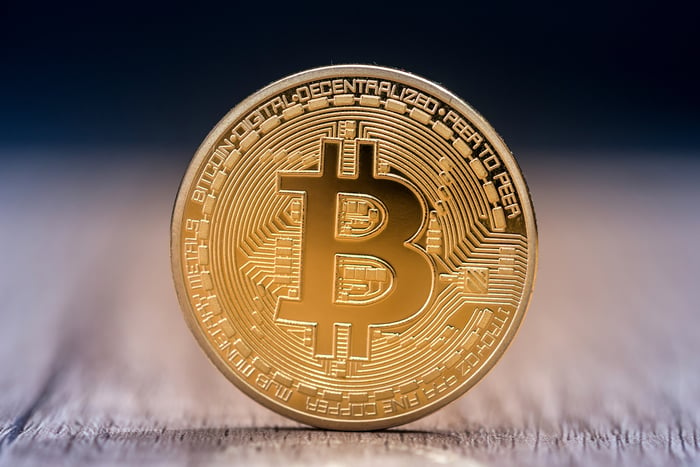It's quite possible you could go through the remainder of your life without seeing the type of gains that cryptocurrencies have delivered for investors in 2017. Ethereum has rallied by more than 3,000% since the year began, while bitcoin, the largest cryptocurrency by market cap, has returned close to 300% year to date, and nearly 1,400% since hitting its lows from two years ago.
Two major reasons cryptocurrencies have soared in 2017
There are a plethora of factors that have lit a fire under cryptocurrencies. Most notably, investors are really excited about the blockchain technology that underlies most digital currencies. Blockchain is nothing more than the digital and decentralized ledger that records transactions without the need for a financial intermediary. Blockchain is believed to be especially secure, and since it's a relatively open network, it would make altering data without anyone else knowing practically impossible. Blockchain could have wide-ranging application from the financial industry to energy trading platforms, and its uses could stretch from business-to-business transactions all the way down to peer-to-peer.

Image source: Getty Images.
Blockchain is in its infancy. Industry pundits have suggested that ethereum's blockchain may be preferred by businesses, and the more than 150 worldwide organizations that have joined the Enterprise Ethereum Alliance to test out a version of the ethereum blockchain suggests that could be the case. However, the recent SegWit2x upgrade for bitcoin should allow it faster transaction settlements, lower transaction fees, and increased capacity, which could appeal to more businesses.
The other pretty notable catalyst for cryptocurrencies, but more specifically bitcoin, is the falling U.S. dollar, which hit more than a two-year low against the euro recently. A falling dollar is great news for President Trump, who's looking to drum up U.S. exports and the manufacturing sector. However, it's not great news for investors who are seeing their dollars devalue. Usually when the dollar drops, investors seek the safety of gold as a store of value, but lately there's been speculation that they're choosing bitcoin instead. After all, an almost 300% gain in eight and a half months would run circles around the falling dollar.
In fact, I've seen the "Will bitcoin replace gold?" headline pop up with growing frequency over the past couple of months, paying credence to the idea that investors truly are choosing bitcoin over gold.
Well, I have news for these investors. Not now, or ever, will bitcoin come to replace gold, and there are a few simple reasons why.

Image source: Getty Images.
Stop dreaming: bitcoin will never replace gold
To begin with, let's consider each asset a resource. Investors are seeking the safety of gold and bitcoin because of their perceived scarcity and store of value. Gold is a true finite resource. What's been mined and is still in the ground is all the gold there will ever be, unless of course we find a way to mine gold from far-off planets or asteroids.
Bitcoin, on the other hand, has protocols written that dictate a maximum of 21 million coins can be mined. However, it's not out of the question that these protocols could be changed to allow for more mining. Bitcoin doesn't have that same finiteness and scarcity factors that gold has.
Second, gold has real-world uses and has been utilized as a currency for centuries. Gold is used in jewelry, has industrial applications as a conductor of electricity, and is used an alloy for dental filings and in crowns. You can walk into any pawn shop right now and trade your gold in for cash, and it's an asset that numerous central banks around the world hold in their vaults.
Bitcoin has few, if any, real-world uses. Though there are a handful of brand-name businesses that have accepted bitcoin since 2014, it would be practically impossible to try to live off bitcoin since so few retailers and businesses accept the digital currency. Since it isn't a physical commodity, its liquidity can be challenging at times.
Lastly, there's a big difference when it comes to regulating these asset. Gold, being a physical asset that trades in organized financial markets, isn't exactly a concern for regulators. As for bitcoin, it trades on numerous exchanges rather than a central exchange, and there have been a number of instances over the past couple of years of cyberattacks and criminals utilizing bitcoin for their gain.
In other words, there's virtually no chance that bitcoin will ever replace gold as the ultimate safe-haven asset.

Image source: Getty Images.
Here's another reason to avoid bitcoin
And should you need just one more reason bitcoin has no shot to overtake gold, take a gander at the Bitcoin Investment Trust (GBTC 4.18%), operated by Grayscale. This is an ETF that holds a relatively fixed amount of bitcoin, giving investors an opportunity to buy into the bitcoin craze with the ease and liquidity of a stock.
As of Aug. 31, 2017, the Bitcoin Investment Trust held 172,721 bitcoins, meaning all an investor would have to do to calculate its net asset value (NAV) is multiply the number of bitcoins by the current price per coin. However, the market cap for Grayscale's bitcoin ETF was almost 70% higher than the NAV as of Friday. That's how far out of sync with reality investors are when it comes to trading bitcoin: They're willing to pay almost 70% more than the net asset value of bitcoin held by Grayscale's ETF.
This gives you some idea of just how volatile and emotional the trade is behind bitcoin, which is all the more reason you should be considering gold, not bitcoin, if you're seeking a safe-haven investment with the dollar declining.





